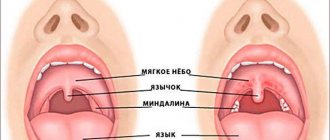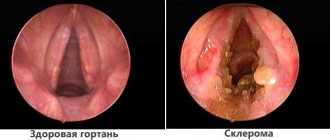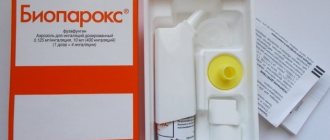A sore throat during pregnancy is a symptom of the disease and should not be ignored. It happens that a slight discomfort in the throat hides completely dangerous diseases. A woman's body undergoes many changes during pregnancy. Unfortunately, the immune system weakens, and protection against pathogens of various diseases sometimes does not work. The onset of a cold is indicated by general malaise, hoarseness, and sore throat. It is important not to miss the first symptoms of an impending disease and begin treatment.
Causes of tickling
Itchy, sore throat is not only caused by colds. A feeling of a coma and a dry cough have various causes, defined as:
A viral infection is accompanied by rhinitis, lacrimation and a sore throat. Hypothermia and eating very cold food (ice cream) cause certain irritations of the larynx. Allergies. The symptoms are similar to a cold, but are caused, for example, by cat hair, pollen, and ordinary dust. A pregnant woman may become more sensitive to various chemicals with strong odors, such as detergents and perfumes. Swelling of the nasopharynx, tearfulness, coughing, and hissing are observed. Problems with the nervous system can cause neurosis of the throat, which is accompanied by a sore throat. In the brain, the function of the nerve endings associated with the pharynx is disrupted. Unfavorable conditions. In a dry, hot room, and even more so in a dusty room, the mucous membrane of the larynx becomes irritated due to drying out, and unpleasant sensations appear. Teachers are susceptible to sore throats due to their activities, which are based on working with the voice and straining the vocal cords.
When does a sore throat occur?
If your throat hurts, you cannot ignore these sensations, because pain serves as a signal of developing trouble in the body. The feeling of pain, soreness, or “lump” in the throat can be caused by various reasons:
- toxicosis;
- viral lesions of the larynx (pharyngitis, ARVI and others);
- bacterial infections (sore throat);
- fungal infections;
- mechanical damage to the mucous membrane (bones from fish or berries, hard food);
- allergic reaction.
Despite the fact that painful sensations in the throat are not always a sign of a serious illness, only a doctor can determine their cause. Therefore, during pregnancy you should not take such symptoms lightly, trying to get rid of the unpleasant sensations on your own.
Such self-medication can lead to the disease moving into an advanced stage and manifesting itself with unpleasant complications.
Treatment of soreness caused by a cold
What should a pregnant woman do when her throat hurts and feels sore? Before treatment, the causes of a sore throat should be accurately determined: infectious or non-infectious.
Treatment for a pregnant woman should be under the guidance of a doctor. Proper therapy will protect the health of the woman and the unborn child. Taking most medications during pregnancy is contraindicated; chemical compounds have a detrimental effect on the development of the fetus. Therefore, traditional medicine comes to the rescue. However, medicinal herbs should be used with caution by pregnant women.
Gargling relieves unpleasant symptoms. Use a warm solution of iodine, soda, and salt. A decoction of chamomile, sage, and calendula is also used. The procedures are repeated several times a day.
Strengthening the immune system. Eat onions and garlic in small portions. If there is no tendency to edema, drink plenty of warm drinks with honey, raspberries, lemon, and aloe juice. Vitamins are a must, pay special attention to vitamin C, eat citrus fruits.
Ginseng tincture as an immunostimulant.
Alcohol tinctures of echinacea and ginseng are used as immunostimulants and are sold in pharmacies. A few drops are diluted with water and drunk for about 10 days. It is recommended to take at the beginning and end of the winter period.
Bee propolis is sold in pharmacies. A propolis plate is chewed in the evening, then nothing is eaten. Has a beneficial effect on the condition of the throat.
A vodka compress is made at night. A piece of cotton wool is moistened with vodka, placed in a bag, and securely attached to the throat with a handkerchief or scarf. The compress has a warming effect.
During a cold, a pregnant woman should remain in bed. Especially when pregnancy occurs with complications. The body works hard, it needs rest.
Medicines based on natural ingredients can be used to treat colds in pregnant women. The soreness is relieved by lozenges, lozenges, aerosols, and sprays. The doctor will select the most appropriate medications to treat the patient.
Sore throat, cough during pregnancy, what to do
We continue our discussion of issues related to the treatment of colds in pregnant women, and will begin a discussion of the treatment of sore throat or cough in pregnant women. These symptoms, along with a runny nose, most often accompany colds in pregnant women. All of them, in themselves, are not dangerous, but during pregnancy, in combination with each other, they can complicate the course of pregnancy and lead to various kinds of complications.
Sore throat
Sore throat, sore throat, discomfort when swallowing and dry throat occur as a result of infection with microbes or viruses. Because of this, redness of the throat and inflammation are formed, which can be localized or spread to all areas of the oropharynx. Typically, signs of inflammation are pharyngitis or tonsillitis, inflammation of the pharynx or tonsils (sore throat). It is worth remembering that sore throat during pregnancy is especially dangerous, since it is a microbial purulent inflammation of the tonsils with the ability to spread to other organs and develop secondary complications due to decreased immunity. If you suspect a sore throat, you should immediately call a doctor at home and stay in bed without taking any medications yourself.
Typically, a cold is accompanied by redness and sore throat, burning sensation, soreness, discomfort and dryness. In this case, there may be hoarseness or hoarseness of the voice, pain when swallowing, and enlarged lymph nodes. As a rule, the initial manifestations of a cold are caused by viral infections, but with a long course of pharyngitis, a microbial infection may be added. How to treat if you develop a sore throat? First of all, rest and bed rest are needed, creating rest for the voice and cords. If the inflammation is severe, the larynx may also be affected - in this case, vocal rest will be the basis of treatment. If you strain the inflamed ligaments, you can lose your voice for a long time. The basis of treatment will be non-drug therapy - the use of plenty of warm drinks and rinses. It is acceptable to take some medications for local therapy, but under the strict supervision of a doctor.
First of all, the main recipe for a sore throat has always been hot milk with butter. They drink it often, sparing no oil; it moisturizes and softens the throat, leading to a faster recovery. You can use herbal teas with honey (linden, chamomile), drink them in small sips, trying to hold the solution in your mouth. An excellent way to treat a throat is to slowly dissolve a spoonful of honey in your mouth so that it has its healing effect. You can use gargles - the most common and helpful, including for sore throat, is gargling with a solution of soda with a drop of iodine. It is prepared in this way: add a teaspoon of baking soda to a glass of warm water, add a drop of regular iodine and stir thoroughly. Rinse your throat with this mixture every two to three hours.
For rinsing, you can use a solution of sea salt, a solution of ordinary salt, herbal decoctions (chamomile, St. John's wort, sage, oak bark), "Rotokan", a solution of furacillin or a slightly pink solution of potassium permanganate. The peculiarity of rinses is that they need to be used frequently, every two to three hours, then they will have a real effect. If you have a severe sore throat, you can use pharmaceutical preparations for local use: this is Miramistin spray solution, Tantum Verde, Strepsils spray, but strictly according to the dosage specified in the instructions. The drugs should be used only in the acute period of the disease; as the condition improves, it is necessary to switch to follow-up treatment with folk remedies. You can use lozenges for resorption like Faringosept, Falimint, Strepsils, but under the supervision of a doctor. The duration of such treatment should not exceed three to five days.
You can use ultrasound and steam inhalations; they can significantly relieve sore throats. Use inhalations with mineral water, herbal decoctions or steam inhalations with essential oils. With the development of a sore throat and high fever, severe sore throat with the presence of ulcers, it is necessary to make a decision on prescribing antibiotics, since there is a high risk of complications of sore throat with damage to the kidneys and heart. Cough during pregnancy
Particularly unpleasant and sometimes even dangerous for a pregnant woman is cough, which can occur as one of the symptoms of colds. Why is a cough dangerous during pregnancy and how to treat it correctly?
First of all, a debilitating cough during pregnancy is unpleasant in itself - strong, dry, painful, it can simply be exhausting. In addition, coughing shocks cause a sharp increase in intra-abdominal pressure, which can lead to increased tone of the uterus, placental abruption, especially if it is low and there is a threat of miscarriage. During pregnancy, due to decreased immunity, a cough can quickly become complicated and lead to bronchitis and even the development of pneumonia, and most cough medications are contraindicated for pregnant women during this period, which significantly complicates its treatment.
How to treat a cough?
First of all, it is necessary to call a doctor at home and prescribe adequate therapy compatible with bearing a child. The basis for treating a cough, if it is dry and hysterical, is ultrasonic inhalation with saline or alkaline mineral water, herbal decoctions that soften the respiratory tract, moisturize the irritated and inflamed trachea and bronchi, and also have a mucus-thinning effect. Inhalations are done every 4-6 hours, inhaling the aerosol for at least 15-20 minutes. Usually, after a properly performed inhalation, it is easier to breathe, the sputum is cleared better and your health improves. Inhalation is prohibited in case of high fever and poor health, severe shortness of breath and a wet, productive cough.
Treatment of soreness caused by non-infectious factors
In addition to colds caused by viruses and bacteria, the throat is irritated by other factors. What to do and how to treat depends on the specific case.
An allergic reaction of a pregnant woman to animal fur, flowering plants, and dust is treated with the use of antihistamines. The doctor prescribes anti-allergy medications. Naturally, contact with irritants should be stopped.
Problems in the functioning of the gastrointestinal tract can be solved by adjusting the diet. Foods that cause increased acidity are excluded from the diet. Your doctor will help you create a proper nutrition plan.
Treatment of pharyngeal neurosis should be entrusted to a specialized doctor - a neurologist.
Any problems with the body, a cold or an allergic reaction, require timely elimination, sometimes medical intervention in the form of medications. In the case of pregnant women, double attention is needed - the health of the child is at stake. The first symptoms should not be ignored. Diseases must be treated under the supervision of specialists.
Quite often, pregnant women experience exacerbations of chronic infectious and inflammatory diseases, as well as infection with various pathogens that provoke a sore throat during pregnancy.
All this is due to certain changes in the woman’s body:
hormonal changes necessary to maintain pregnancy; decreased activity of the immune system, which prevents conflict between the fetus and the woman; depressive states, stress associated both with the awareness of pregnancy itself and with hormonal changes; lack of vitamins and microelements, since they are consumed by two organisms.
In the third trimester, the fetus's protection is more resistant to the influence of negative factors. It is provided by the protective factors of the fetus and the fully formed placenta.
When you have a sore throat during pregnancy, some of the reasons include:
viral pathogenic microorganisms (ARVI, influenza). A viral disease can be suspected based on clinical signs (nasal congestion, rhinorrhea, cephalgia, joint, muscle aches, malaise, dizziness, low-grade hyperthermia and loss of appetite. bacterial pathogens, for example, streptococci, the activity of which damages the mucous membrane of the tonsils, provoking tonsillitis. Symptomatically, the disease manifests itself intensely sore throat, febrile hyperthermia and manifestations of intoxication. provoking environmental factors, for example, cold/dry air, smog, which, with prolonged exposure, provoke irritation of the mucous membrane with subsequent development of inflammation. Microtraumatization of the membrane leads to a decrease in protective functions, which predisposes to infection. allergic factor (wool, pollen, fluff, dust), which, after contact with the mucous membrane of the oro-/nasopharynx, leads to the development of allergic pharyngopathy.The woman is also worried about skin itching, rhinorrhea, lacrimation and cough.
Particularly dangerous during pregnancy are infections in which the infectious pathogen circulates through the bloodstream, increasing the risk of complications, including from the fetus.
Dry cough treatment during pregnancy 39 weeks
In the final stages, the fetus is already fully formed, the main organs are developed, and the nervous system continues to improve. Thanks to the immune properties of the mother's body, the child is protected from harmful external influences. To relieve inflammation, neutralize a sore throat and dry cough, treatment during pregnancy is possible using the same means as in earlier periods of pregnancy. Expectant mothers can gargle with a saline-soda solution, herbal decoctions, perform inhalations , and monitor the air humidity in the room. Warm milk with the addition of butter or olive oil effectively relieves irritation . Following the regime and performing effective procedures will help you quickly feel relief.
Prohibited drugs - treatment during pregnancy 39 weeks:
- medications containing codeine – Codelac, Glycodin – increase the risk of developing severe fetal pathologies;
- drugs that stimulate a productive cough cause muscle contraction, which is dangerous due to the tone of the uterus and the threat of miscarriage, the onset of premature labor, these include Bronholitin, ACC;
- Ascoril contains aggressive compounds that penetrate the placental barrier and can cause serious developmental disorders, the formation of systems and organs.
The appearance of signs of respiratory disease is dangerous for both the mother and the fetus. Neutralize a sore throat and dry cough; treatment during pregnancy should be carried out under the supervision of a doctor. In addition to drug therapy, the use of folk recipes for rinsing and inhalation is effective.
General recommendations
Recovery can be accelerated not only by local exposure to the affected area, but also by methods that strengthen the immune system and fight infection. A pregnant woman must follow the following rules:
restriction of physical activity, sometimes bed rest is required; reducing the duration of contact with people sick with infectious diseases; limit the perception of stress; eat right, focusing on vitamin-rich foods; plenty of warm drinks, for example, compotes, teas, fruit drinks and jelly. The liquid allows you to speed up the elimination of toxic products.
In the third trimester, the volume of daily fluid should be monitored by a doctor to avoid the appearance of edema.
vitamin therapy with special complexes for pregnant women; regular ventilation of the room, frequent wet cleaning.
If discomfort appears in the throat of a pregnant woman, it is forbidden to:
take antibacterial/antiviral drugs without prior consultation with a specialist; use drugs and herbs prohibited during pregnancy (sage for internal use); carry out procedures involving the use of hot water or steam (hot showers, mustard plasters, compresses, foot baths).
Products for internal use
One of the most effective ways to combat a sore throat is warm (not hot) drinks, including tea, black or green, compotes and fruit drinks. It is important to note that you can only drink acidic drinks - for example, cranberry juice - if you have ARVI and sore throat. With pharyngitis, the acid contained in the liquid will only irritate the mucous membrane of the throat and increase discomfort.
Milk is one of the most effective remedies for fighting a sore throat. It needs to be slightly warmed up, if desired, add honey, a piece of butter and drink the solution in small sips 3-4 times a day. Instead of regular tea, you can drink decoctions of chamomile, currant leaves, dried raspberries, and rose hips, which are good for relieving the unpleasant symptoms of ARVI.
Video - acute respiratory infections during pregnancy
Inhalations for a sore throat
The safest and most convenient inhalation is carried out using a nebulizer. The device uses the following tools:
Chlorophyllipt has an anti-inflammatory effect on the mucous membrane of the pharynx. Stimulation of regenerative processes ensures rapid healing of the mucous membrane. The solution is diluted 10 times with saline. Eucalyptus tincture diluted with 1 drop per 20 ml of saline solution allows you to moisturize and soothe the mucous membrane of the oropharynx. alkaline inhalations with mineral still water (Borjomi, Essentuki). 4 ml of water (without dilution) is enough. Rotokan is diluted 40 times. Thanks to its herbal composition, the medicine quickly restores the structure of the mucous membrane of the pharynx. Furacillin is used if an infection of the mucous membrane is suspected. Depending on the concentration of the purchased solution, it should be used in pure form or further diluted with saline. Dioxidin has a powerful antimicrobial effect. It is recommended to dilute 5 times. Miramistin is also indicated for infectious lesions of the pharynx mucosa.
First steps for a sore throat in pregnant women
For a woman carrying a baby, it is very important not to start the disease and eliminate its manifestations at an early stage.
You can start with alternative treatment, but only if:
- there is a soreness in the larynx;
- pain when swallowing is not pronounced;
- no increase in temperature is observed.
An effective remedy for eliminating the disease at an early stage is baking soda. It can be used for inhalation. For this, 1 tsp. The powder is dissolved in 250 ml of hot water and the steam is inhaled.
Inhalations with sage and chamomile, from which a decoction is prepared, are also useful. Plants have anti-inflammatory and antibacterial properties and do not have a negative effect on the unborn child.
Raspberries or lingonberries can be used as a natural antibiotic. Warm raspberry tea or lingonberry juice relieves pain well. It is also recommended to gargle with infusions of chamomile, coltsfoot, and oak bark.
To avoid irritating your sore throat even more, you should only consume warm foods and drinks. Hot or cold food or liquid further injures a sore throat. If therapy was started when the first symptoms appeared, the mucous membrane can be restored in 2-3 days.
Features of inhalation with a nebulizer
The benefits of nebulizer therapy include:
steam temperature control, which prevents burns; strict adherence to dosage; Possibility of use in a lying position; does not require synchronization with breathing; constant supply of medicine; the ability to adjust the diameter of the particles into which the medicinal solution is broken down.
Essential oil is not used for nebulization, as small particles can reduce the clearance of the respiratory tract and make breathing difficult. In addition, oil particles contaminate the device, therefore increasing the risk of the proliferation of infectious microbes in the components of the nebulizer, after which it becomes a source of infection.
To dilute medicinal solutions, only saline solution heated to room temperature is used. The device uses 1 ml of saline solution to operate. For one inhalation procedure, 4 ml of the prepared solution is sufficient.
After inhalation, you should not go out into the cold so as not to reduce the therapeutic effect of the procedure.
Prevention of cough, runny nose and colds during pregnancy
The strong opinion that a disease is easier to prevent than to treat is confirmed by a person’s desire to lead a healthy lifestyle, periodically undergo medical examinations, and resort to preventive measures to protect against diseases.
Of course, it is not always possible to prevent a cold, especially in women expecting a child, and this is due, first of all, to the weakening of their immunity. But an attempt to protect yourself from a disease is always better than a negligent attitude towards it, so the following recommendations will not be superfluous.
Prevention of a runny nose
In addition to the above-mentioned rules of conduct during colds (regime, ventilation, etc.), more specific methods of protection can be used to prevent colds.
- For example, upon returning home from a crowded place (clinic, store, transport), rinse the nasal passages with saline or a preparation based on sea water (or at least moisten them with a bottle with a dispenser).
- Heated debates are flaring up about the next remedy, but one thing is certain - such prevention will not cause harm. During the period of exacerbation of respiratory infections among household members, arrange aromatherapy in the house with antimicrobial substances of plant origin (phytoncides) contained in onions or garlic. The benefits of this remedy have not been scientifically proven, but if it works for you, at least as a placebo, why not.
- For the same purpose, you can use aromatic oils of orange, eucalyptus, tea tree, lime, and lavender.
Exercises for the nasal passages
In order to almost always breathe through your nose, you should get used to exercises for the nasal passages, which can be done at any time, and even more so during seasonal colds. As practice shows, thanks to these simple exercises you can forever forget about vasodilating drops or nasal sprays.
- Nasal breathing should be free before starting exercises, so you can get rid of congestion with the help of nasal medications.
- Take a few deep breaths in and out to make sure your nose is breathing.
- Press one nostril with your index finger and take 8-10 quick, forceful exhalations with the other, as if moving air through the nasal passage.
- Do the same with the other nostril.
- In conclusion, take 8-10 forceful exhalations through both nostrils, then restore your breathing and breathe calmly.
This exercise for the nose can be done several times a day with a break of at least 1 hour. If you feel dizzy after the procedure, you should tell your doctor about it.
Cough prevention
To prevent a situation where your throat hurts and a severe cough appears during pregnancy, sometimes it is enough to follow simple rules of behavior:
- You shouldn’t get carried away with ice cream and cold drinks (pregnant women don’t need them at all);
- drafts, cooling or getting wet feet, and other hypothermia should be avoided;
- there is no need to poison the mucous membranes of the respiratory tract with nicotine smoke, which negatively affects the immunity of the pharynx;
- You definitely need to eat well and get enough sleep, spend more time in the fresh air and exercise as much physical activity as you can.
The next video contains additional recommendations on how to properly rinse your nose with a teapot when you have a runny nose.
How can a pregnant woman treat sore throat caused by non-infectious factors?
When the cause of soreness is an allergic reaction to some external irritant, a woman should try to clearly identify the allergens and, if possible, stop all contact with them.
However, if avoiding exposure to allergens is not possible, women may be prescribed antihistamines.
In any case, a woman should not prescribe such medications on her own, as this can be dangerous for the course of pregnancy.
When the cause of tickling is pharyngeal neurosis, endocrine diseases or gastrointestinal diseases, treatment of a pregnant woman should be carried out exclusively under the supervision of specialized specialists. Some of the problems, in this case, may disappear with a simple adjustment of the regime or diet, which, however, is also better to coordinate with the doctor.










